SWEDISH SOUTH ASIAN STUDIES NETWORK
Department of Water and Environmental Studies,
Tema Institute, Linköping
University:
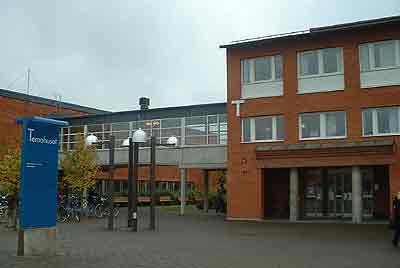 Postal
Address: Tema Vatten i natur och samhälle (Tema V), Institutionen
för Tema, Linköpings
universitet, SE-581 83 Linköping
Postal
Address: Tema Vatten i natur och samhälle (Tema V), Institutionen
för Tema, Linköpings
universitet, SE-581 83 Linköping
Visiting Address: House T, Linköping University, Campus Valla
Web page: http://www.tema.liu.se/tema-v/
Contact person: Associate Professor Julie Wilk, phone: +46 (0)13 28 44 63
Water and Environmental Studies (Tema V) is a centre
for multi- and interdisciplinary postgraduate training and research within
the Tema Institute at Linköping University. The Tema Institute is
part of the Faculty of Arts and Sciences and answers for a substantial
amount of its graduate education, research and postgraduate training.
Tema V began its activities in 1980 on a rather modest scale, but two
decades later it has grown to nearly 80 persons, the majority being postgraduate
students. In its present form, it is the melting-pot for chemists, physicists,
technicians, microbiologists, molecular biologists, ecologists, geographers,
oceanographers, political scientists, hydrologists, limnologists, social
anthropologists, historians, sociologists, ecotoxicologists, statisticians,
national economists and ethnogeographists.
Research at Tema V is focused on water and environmental problems relevant
to society. Tema V research has been financed by all Swedish research
councils and sectoral agencies, by Sida (Swedish International Development
Cooperation Agency), and in recent years also by the European Union.
For many years, the department was headed by Professor Jan
Lundqvist. He is now working at the Stockholm International Water Institute (SIWI). Since 2003, he has chaired SIWI’s Scientific Programme Committee, and been involved in planning the symposia taking
place every year in August in connection with the Stockholm Water Week. More
information about the World Water Week in Stockholm.
South Asia related Masters of Science course:
A 120 ECTS Credits International Master's Programme
in Science for Sustainable Development started in 2007. It is organised by the Faculty of Arts and Sciences, and
leads to a Master in Science degree in Sustainable Development,
with a specialization in one of the following areas:
1. Climate, Energy & Recycling;
2. Water & Food
Security; or 3. GIS for Environmental Studies. Focus in the first
two study areas will be directed to both how social changes shape
the environment, and how environmental changes shape society. Next programme starts in September 2010. ![]()
More
information about the programme.
Contact person: Lotta Berglund
Research projects on South Asia:
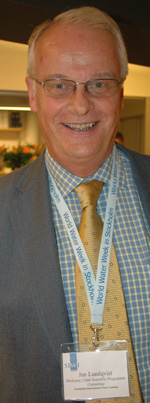 The Department has been involved in a number of research
and policy oriented projects in South Asia, primarily in India and in
Sri Lanka. The common theme of the engagements concerns water and land
resources and their management, utilisation and the implications thereof.
The Department has been involved in a number of research
and policy oriented projects in South Asia, primarily in India and in
Sri Lanka. The common theme of the engagements concerns water and land
resources and their management, utilisation and the implications thereof.
In the Fall 2002 the department,
through Prof Jan Lundqvist,
secured funding from the Swedish Research Links programme, for a major
project on water resources management in South India, which is carried
out in collaboration with the South
Asia Consortium for Interdisciplinary Water Resources Studies (SaciWATERs),
with its headquarters in Hyderabad, India (Project leader: Dr
A Rajagopal). The project ran
over a period of three years.
The objectives of the project were to:
– analyse dynamics of water availability & variation in quality parameters in two selected basins (in the states of Tamil Nadu and Andhra Pradesh)
– produce a water budget, showing physical and social mechanisms that influece availability and accessability
– analyse factors which contribute to differential access to water, particularly risks and challenges that the poor face
– identify opportunities for empowering the poor by enhancing their negotiation capacities through multi-stakeholder dialogue (MSD)
Prof Gunnar Jacks, Dept of Land and Water Resources Engineering, KTH, Stockholm; Prof K Palanisami, Water Technology Centre, Tamil Nadu Agricultural University, Coimbatore; and Prof Paul Appasmy, Madras School of Economics, Chennai, India, are also partners in the project.
In November 2004, Prof. Jan Lundqvist received SEK 2.5 million
as a three-years (2005-07) research grant from the Swedish Research Council for Environment, Agricultural Sciences and Spatial Planning (Formas) for a project
titled ”Over-committed River Basins – A case study in Southern India with a comparative outlook”. More
information about the project (only in Swedish).
In November 2005 Prof. Lundqvist received SEK 1 million
as a two-years (2006-07) research grant from Sida/SAREC for a project
titled ”Rights
and Participation in Policy Making and Management of Scarce Water Resources
(Tamil Nadu and Andhra Pradesh)”. More
information on Sida funded South Asia related research projects in 2005.
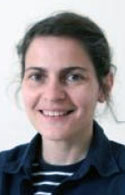 • Dr. Julie
Wilk is a Research Associate at the Department. She
is a hydrogeographer with over ten years of experience in hydrological
modelling, GIS applications and data collection and validation of
statistical and local knowledge about natural resources. Her doctoral
thesis dealt with hydrological implications
of large-scale changes in land use in South India and in Thailand.
She has also analysed perceptions about forest-water interactions
among community members and to what extent they concur with scientific
perspectives. She defended her PhD thesis on ”Do
forests have an impact on water availability? Assessing the effects
of heterogeneous land use on streamflow in two monsoonal river
basins” in December
2000. More information.
• Dr. Julie
Wilk is a Research Associate at the Department. She
is a hydrogeographer with over ten years of experience in hydrological
modelling, GIS applications and data collection and validation of
statistical and local knowledge about natural resources. Her doctoral
thesis dealt with hydrological implications
of large-scale changes in land use in South India and in Thailand.
She has also analysed perceptions about forest-water interactions
among community members and to what extent they concur with scientific
perspectives. She defended her PhD thesis on ”Do
forests have an impact on water availability? Assessing the effects
of heterogeneous land use on streamflow in two monsoonal river
basins” in December
2000. More information.
• In a research programme entitled
”Sharing Common Water Resources”, Dr. Anna Jonsson,
made a comparison between water management institutions in rural and
urban areas in Tamil Nadu, and particularly the role of collective action.
She defended her doctoral thesis in 1996. The title was: ”Food
and Fashion. Water Management and Collective Action among Irrigation Farmers
and Textile Industrialists in South India”. She
is an institutional economist with 15 years experience in stakeholder
oriented research on socio-economic and institutional contexts affecting
water resource management. T is a multi-disciplinary
department with a strong basis in both undergradate education and research
in diverse environmental fields.
Assistant Professor Anna Jonsson is now working as a lecturer
at the Environmental Science Programme at Linköping
University. She has been involved in a major
research project called ”Strategic Water
Research Program – VASTRA Phase II, Subprogramme 2. Selecting policy
instruments, institutions, and conflict resolution mechanisms for sustainable
catchment management”. The project leader was Prof. Jan
Lundqvist; and other
participants Marianne Löwgren
from the same department; Dennis Collentine,
Swedish Agicultural University, Uppsala; and Victor
Galaz, Dept. of Political Science, Göteborg University.
The three-years project (2002-2004) was funded by a SEK 5.3 million
grant from MISTRA
(Swedish Foundation for Strategic Environmental Research). More
information on the project (as a pdf-file).
In August 2005 Julie
Wilk and Anna
Jonsson received SEK
60 000 as a SASNET planning grant for
a project titled ”Defining water
poverty to meet local goals, through stakeholder involvement in the Bhavani
River Basin, India”.
The project is carried out in collaboiration with Caroline
Sullivan,
an environmental and ecological economist at the Centre
of Ecology and Hydrology (CEH), Wallingford, UK, who has worked
in the field of "development
and the environment" for over 20 years and is one of the researchers
who developed the Water Poverty Index. CEH is an interdisciplinary
research centre for ecology, hydrology, virology and environmental
microbiology. Its mission is ”to advance the science of ecology, environmental
microbiology and hydrology through high quality and interdisciplinary
research in support of the NERC mission and international programmes.”
In November 2005 this project received SEK 1 650 000 as a three-years
(2006-08) research grant from Sida/SAREC. More
information on Sida funded South Asia related research projects in
2005.
Project abstract: This proposed project's aim is to initiate stakeholder
participation in a village within a relevant river basin in south Asia
(e.g. India, Nepal, Bangladesh) in order to map current water usage and
problems with a Water Poverty Index (WPI). This index has been designed
and used in order to identify and evaluate poverty in relation to water
resources. It is a means in which various groups can become aware of the
current status and problems related to water resources (availability, sanitation,
ecosystems, etc, develop common goals, monitor change and relay status
and progress to authorities. The calculation of a WPI is not a means in
itself but a tool to enable the definition of components in the local area
that are important in relation to water and poverty. The WPI method is
based on participation and group discussion, a prerequisite for local voices
to be heard and results anchored and legitimised in the local and regional
setting.
In October 2010, Julie Wilk and Anna Jonsson were awarded SEK 2.7 m as a three-years grant (2011-13) from Sida/SAREC’s Developing Country Research Council for a comparative project entitled ”Designing climate-smart water adaptation strategies for sustainable urban development. A study of Cochahamba, Phnom Penh and Kota”. A third partner in the project is Dr. Maria Rydhagen, Blekinge Institute of Technology in Karlshamn. More information. ![]()
Project abstract: The aim of the project is to assess the vulnerability and adaptive capacity in cities and to formulate sustainable planning
strategies that address the major impacts of climate changes. Planning for water (storm- potable- and wastewater) is in focus
since water resource already today is complicated to manage for societies? every needs and the situation is predicated to
become even more critical in the future. A toolbox for participatory integrated vulnerability assessments with local communities
and authorities has been developed with reference to climate change and adaptation planning in Sweden and the Baltic
countries. In this study, we want to customize and test the tool box in the three urban areas Cochabamba (Bolivia), Phnom
Penh (Cambodia) and Kota (India). These cities represent large growing regions (but not megacities) in different countries,
facing sustainable development challenges together with varied and difficult water situations and anticipated harmful climate
change impacts. The project outcome will contribute to improved urban water management for sustainable climate change
adaptation in developing countries through an improved methodology of vulnerability assessments, contribution to capacity
building and social learning, and specific empirical understanding of the three case study contexts.
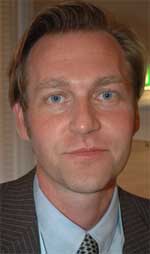 • The
role of NGOs in urban environmental management was studied by PhD Håkan
Tropp (photo to the right). He defended his doctoral
dissertation thesis in 1999 on ”Patronage,
Politics and Pollution. Precarious NGO-State Relationships: Urban Environmental
issues in South India”. Håkan Tropp is
now working as Project Director at Stockholm
International Water Institute (SIWI), and as Advisor to the UNDP
Water Governance Facility (WGF) managed by and funded by United
Nations Development Programme (UNDP) and the Swedish Agency for International
Development Cooperation (Sida), but located at SIWI in Stockholm. This
programme supports development countries to improve water governance.
Adhering to the achievements of the Millennium Development Goals (MDGs),
the WGF promotes ”Prudent
water management crucial for reaching national development
objectives and for improving the livelihoods of poor people.
• The
role of NGOs in urban environmental management was studied by PhD Håkan
Tropp (photo to the right). He defended his doctoral
dissertation thesis in 1999 on ”Patronage,
Politics and Pollution. Precarious NGO-State Relationships: Urban Environmental
issues in South India”. Håkan Tropp is
now working as Project Director at Stockholm
International Water Institute (SIWI), and as Advisor to the UNDP
Water Governance Facility (WGF) managed by and funded by United
Nations Development Programme (UNDP) and the Swedish Agency for International
Development Cooperation (Sida), but located at SIWI in Stockholm. This
programme supports development countries to improve water governance.
Adhering to the achievements of the Millennium Development Goals (MDGs),
the WGF promotes ”Prudent
water management crucial for reaching national development
objectives and for improving the livelihoods of poor people.
Håkan
Tropp is also one of leading
organisers behind World Water Weeks, the grand water research conferences
that SIWI arranges in Stockholm in late August every year. More
information about the World Water Week in Stockholm.
• PhD Lotta
Andersson defended her doctoral dissertation at the
department in 1999. Together wih Prof. Lundquist she has been responsible for the above projects and has collaborated
with several colleagues in South Asia.
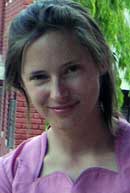 • PhD Jenny
Grönwall defended her doctoral dissertation titled ”Access to water
Rights, obligations and the Bangalore situation” on Wednesday 4 June 2008. Faculty opponent was Professor S. Janakarajan, Madras Institute of Development Studies (MIDS), Chennai, India. More information.
• PhD Jenny
Grönwall defended her doctoral dissertation titled ”Access to water
Rights, obligations and the Bangalore situation” on Wednesday 4 June 2008. Faculty opponent was Professor S. Janakarajan, Madras Institute of Development Studies (MIDS), Chennai, India. More information.
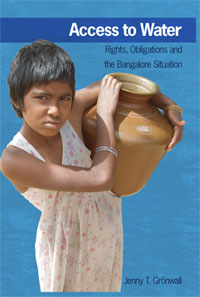 Abstract: The city of Bangalore in southern India is undergoing rapid urbanisation and administrative transition. Its growth puts pressure on the available water sources – being mainly the disputed inter-State River Cauvery and the hard-rock aquifers – with ensuing problems of access. These aspects affect how rights to and over water are fulfilled and perceived. Competition for drinking water is intensifying worldwide and over a billion people are estimated to lack safe access to it. Urbanisation and other demographic trends, along with globalisation and climate change, are adding to the changing patterns of water scarcity. The role of rights in attaining and improving access to water is undoubtedly great and often referred to in the general water management debate. The notion is analysed here as having three interlinked dimensions: the right to water as a human right; water as a property right; and water rights. Law treats these rights, and thereby water, differently. For instance, groundwater has traditionally been thought of as invisible and unpredictable. Partly for this reason, it is still left largely unregulated in many parts of the world. In India, according to the proverb, ‘the landlord is a water lord’. This has effects on the claim for water as a human right. The dissertation shows that we cannot talk in terms of water and rights until we are aware of how complex rights apply simultaneously, and how they correspond to obligations.
Abstract: The city of Bangalore in southern India is undergoing rapid urbanisation and administrative transition. Its growth puts pressure on the available water sources – being mainly the disputed inter-State River Cauvery and the hard-rock aquifers – with ensuing problems of access. These aspects affect how rights to and over water are fulfilled and perceived. Competition for drinking water is intensifying worldwide and over a billion people are estimated to lack safe access to it. Urbanisation and other demographic trends, along with globalisation and climate change, are adding to the changing patterns of water scarcity. The role of rights in attaining and improving access to water is undoubtedly great and often referred to in the general water management debate. The notion is analysed here as having three interlinked dimensions: the right to water as a human right; water as a property right; and water rights. Law treats these rights, and thereby water, differently. For instance, groundwater has traditionally been thought of as invisible and unpredictable. Partly for this reason, it is still left largely unregulated in many parts of the world. In India, according to the proverb, ‘the landlord is a water lord’. This has effects on the claim for water as a human right. The dissertation shows that we cannot talk in terms of water and rights until we are aware of how complex rights apply simultaneously, and how they correspond to obligations.
During her field work Jenny Grönwall also met representatives for
the Bangalore based organisation Oxfam
– India, since several years working with the South
India Water Management Programme, funded by the Swedish International
Development Cooperation Agency, Sida. They carry out a programme in the
Gundar River basin, Tamil Nadu, and in Arkavathi, Karnataka. These
contacts mean that Grönwall
has also been connected to this programme.
In June 2008, Dr. Jenny Grönwall moved to the Dept. of Systems Ecology at Stockholm University where she pursued a post-doc study focusing on urban development in Bangalore city, India, for two years.
From March 2011, Jenny Grönwall works as Technical Officer at the WaterWise division,
Abu Dhabi Regulation and Supervision Bureau in the United Arab Emirates. This is a government agency aiming at enhancing water efficiency in the Emirate of Abu Dhabi.![]()
 Mats
Lannerstad has also worked on South India project. His education and field of expertise focuses on water from different research discipline angles, and stretches from local freshwater ecology concerns to water related and water dependent global agricultural changes and challenges.
Mats
Lannerstad has also worked on South India project. His education and field of expertise focuses on water from different research discipline angles, and stretches from local freshwater ecology concerns to water related and water dependent global agricultural changes and challenges.
On Monday 20 April 2009, he defended his doctoral dissertation entitled ”Water Realities and Development Trajectories – Global and Local Agricultural Production Dynamics”. Faculty opponent was Professor Paul Appasamy from Karunya University in
Coimbatore, India. The thesis focuses on the water and agricultural production complexity in a global, regional and local perspective during different phases of development. It addresses the river basin closing process in light of consumptive water use changes, land use alterations, past and future food production in waterscarce developing countries in general, and a south Indian case study basin in particular, the Bhavani basin in Tamil Nadu. The study focuses on early phases of global agricultural development and addresses consumptive use and river depletion in response to land use change and irrigation expansion. It shows that focus must be shifted from a water use to a consumptive water use notion that considers both green and blue water resources. More information, including abstract. ![]()
During his research work, he was involved
in a Comprehensive Assessment project run by the International
Water Management Institute.
Dr. Lannerstad is now working at Stockholm Environment Institute (SEI), as a Research Fellow. He is the project leader and co-author of a joint book project between the SEI and the Stockholm Resilience Centre. The book centres on water for food and ecosystems, and will build on recent advancements in socio-ecological resilience and place the entire water-food-ecosystem nexus in the global environmental change perspective. His resent work centres on global water requirements for food production to meet the needs and demands of a growing, and still partly starving, world population, and water resource management on river basin scale, in a basin closure perspective. ![]()
• Apart from the above mentioned research projects, staff has been involved in the preparation of bi-lateral agreement between India and Sweden (1996-1998). The department is also engaged in other networks, i e apart from SASNET, where partners from India participate. River Basin Management, for instance, is a topic, which is subject to comparative studies under the auspices of the International Hydrological Programme (UNESCO), including India, New Zealand and South Africa.
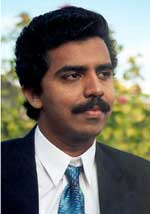 •
In the Fall 2002 Dr Prakash
Nelliyat, environmental economist from Madras
School of Economics, Chennai, India, spent two months at the department,
on a scholarship from the World Bank. Nelliyat, who had assisted
Anna Blomqvist previously, was himself working on a doctoral thesis
on the Industrial Water Pollution in Tiruppur.
On 2 October 2002, he held a SASNET lecture at Lund University, on ”Environmental
cost of T-shirts. The case of Tirupur, India”.
•
In the Fall 2002 Dr Prakash
Nelliyat, environmental economist from Madras
School of Economics, Chennai, India, spent two months at the department,
on a scholarship from the World Bank. Nelliyat, who had assisted
Anna Blomqvist previously, was himself working on a doctoral thesis
on the Industrial Water Pollution in Tiruppur.
On 2 October 2002, he held a SASNET lecture at Lund University, on ”Environmental
cost of T-shirts. The case of Tirupur, India”.
On 22 November 2006,
Prakash Nelliyat defended his doctoral dissertation titled ”Industrial
Growth and Environmental Degradation A Case Study of Industrial Pollution
in Tiruppur”
at the University of Madras. He is now working as a Research Associate
at Madras School of Economics together with Professor Paul P Appasamy
(who also was his supervisor for the thesis project).
Abstract: The thesis deals with the rapid economic growth achieved after
globalization, and how it has adversely affected the quality of the environment,
imposed considerable social costs and livelihood impacts and has become
a major threat to sustainable development. It studies an attempt towards
the operationalization of sustainable development strategies through
a case study of Tiruppur, a major textile cluster in South India, where
around 700 units are discharging more than 80 million litres per day
of effluents without proper treatment. Even though industries incurred
large expenditure for pollution abatement through the construction of
278 Individual Effluent Treatment Plants (IETPs) and 8 Common Effluent
Treatment Plants (CETPs), the treatment system is insufficient for reducing
total dissolved solids (TDS) or salts particularly chloride and sulphate.
The industries in Tiruppur themselves have been affected by pollution.
Since their own wells were contaminated, industries had to transport
a major share of the required water from peripheral villages
at a cost of above Rs. 90 crore per year. Subsequently, a major public-private
scheme was developed bring water from the Cauvery River from a distance
of 55 Km. There is also evidence of pollution impact on human health
and biodiversity. A comparison of the relevant economic indicators and
environmental indicators for Tiruppur clearly reveals that the industrial
growth in Tiruppur has not been environmentally sustainable, due to the
failure of markets, policies and institutions. The thesis concludes with
recommendations of certain policies for achieving environmentally sustainable
industrial development of Tiruppur. Read the
full abstract of the thesis (as a pdf-file).
 Dr. Nelliyat regularly participates in the Stockholm World
Water Week, held every year in August. In the 2007 World Water Week he
lectured about ”Financing Water Supply through
Public-Private Partnerships: Lessons from an Indian Case Study”,
in a session titled ”Progress
on Financing Water Services”. The session
was convened by Stockholm International Water Institute (SIWI) together
with Global Water Partnership (GWP) and EU Water Initiative – Finance
Working Group (EUWI-FWG). More
information.
Dr. Nelliyat regularly participates in the Stockholm World
Water Week, held every year in August. In the 2007 World Water Week he
lectured about ”Financing Water Supply through
Public-Private Partnerships: Lessons from an Indian Case Study”,
in a session titled ”Progress
on Financing Water Services”. The session
was convened by Stockholm International Water Institute (SIWI) together
with Global Water Partnership (GWP) and EU Water Initiative – Finance
Working Group (EUWI-FWG). More
information.
SASNET - Swedish South Asian Studies Network/Lund
University
Address: Scheelevägen 15 D, SE-223 70 Lund, Sweden
Phone: +46 46 222 73 40
Webmaster: Lars Eklund
Last updated
2011-04-28
